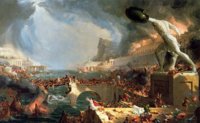Excerpt from the essay "The Fate of Empires" written by Sir John Glubb in 1976
In the first half of the ninth century, Baghdad enjoyed its High Noon as the greatest and the richest city in the world. In 861, however, the reigning Khalif (caliph), Mutawakkil, was murdered by his Turkish mercenaries, who set up a military dictatorship, which lasted for some thirty years. During this period the empire fell apart, the various dominions and provinces each assuming virtual independence and seeking its own interests. Baghdad, lately the capital of a vast empire, found its authority limited to Iraq alone.
The works of the contemporary historians of Baghdad in the early tenth century are still available. They deeply deplored the degeneracy of the times in which they lived, emphasising particularly the indifference to religion, the increasing materialism and the laxity of sexual morals. They lamented also the corruption of the officials of the government and the fact that politicians always seemed to amass large fortunes while they were in office.
The historians commented bitterly on the extraordinary influence acquired by popular singers over young people, resulting in a decline in sexual morality. The 'pop' singers of Baghdad accompanied their erotic songs on the lute, an instrument resembling the modern guitar. In the second half of the tenth century, as a result, much obscene sexual language came increasingly into use, such as would not have been tolerated in an earlier age. Several khalifs issued orders banning 'pop' singers from the capital, but within a few years they always returned.
An increase in the influence of women in public life has often been associated with national decline. The later Romans complained that, although Rome ruled the world, women ruled Rome. In the tenth century, a similar tendency was observable in the Arab Empire, the women demanding admission to the professions hitherto monopolised by men. 'What,' wrote the contemporary historian, Ibn Bessam, 'have the professions of clerk, tax-collector or preacher to do with women? These occupations have always been limited to men alone.' Many women practised law, while others obtained posts as university professors. There was an agitation for the appointment of female judges, which, however, does not appear to have succeeded.
Soon after this period, government and public order collapsed, and foreign invaders overran the country. The resulting increase in confusion and violence made it unsafe for women to move unescorted in the streets, with the result that this feminist movement collapsed.
The disorders following the military takeover in 861, and the loss of the empire, had played havoc with the economy. At such a moment, it might have been expected that everyone would redouble their efforts to save the country from bankruptcy, but nothing of the kind occurred. Instead, at this moment of declining trade and financial stringency, the people of Baghdad introduced a five-day week.
When I first read these contemporary descriptions of tenth-century Baghdad, I could scarcely believe my eyes. I told myself that this must be a joke! The descriptions might have been taken out of The Times today. The resemblance of all the details was especially breathtaking—the break-up of the empire, the abandonment of sexual morality, the 'pop' singers with their guitars, the entry of women into the professions, the five-day week. I would not venture to attempt an explanation! There are so many mysteries about human life which are far beyond our comprehension.






